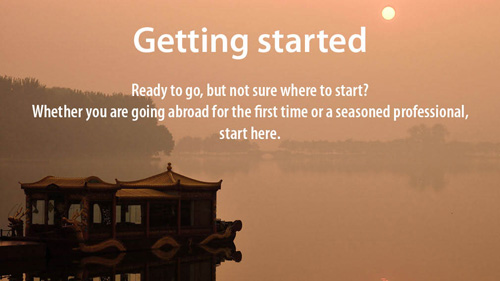Most people expect to encounter some sort of culture shock when they arrive in a new place and are exposed to a different culture and way of life. You may have prepared yourself by researching the language, food, customs and beliefs of your host country and by recognizing that there will be a period of some struggle and adaptation at the beginning of your time abroad.
What many people don’t realize is that there is often a similar experience of struggle and adaptation that occurs after you have returned to your home country. This process may even be more difficult than your initial bout of culture shock because it might be unexpected and it may be difficult to understand and accept that you have to re-adapt to your home culture. Since there is no set way of experiencing culture shock, it can sometimes be challenging to diagnose it as the cause of some of the symptoms you might be noticing. Feelings of guilt, restlessness, loss of purpose or confidence, anger and a sense of disconnection or that nobody understands you are some common signs that you may be experiencing reverse culture shock.
Stages of Reverse Culture Shock
The good news is that there is a beginning, middle and end to the culture shock process, with distinct stages that follow a U-shaped curve. However, each person’s experience is unique and the time it takes to pass through each stage may vary considerably based on your individual experience and circumstances. Recognizing where you are on the curve and what lies ahead can be helpful.
Stage 1: Disengagement
As your experience winds to a close, you may start to shift your attention to your imminent homecoming. You might feel so excited to get home that you don’t give yourself time to properly process your emotions about leaving or engage in appropriate farewells. Alternately, you may feel sad and frustrated that you are leaving just when you are starting to feel comfortable in your environment and competent in your role and environment. These feelings may be compounded by the fact that you have to say goodbye to new friends that you might not have a chance to see again.
Stage 2: Honeymoon
This stage might begin right before you leave or as soon as your arrive home. The anticipation of seeing family and friends, visiting your favorite restaurants or engaging in activities you have missed may make you very excited. When you return your family and friends might be very happy to see you and you and you may be excited to see them and return to your old routines and pastimes. However, the life you are returning to is not the same--you have changed and so have the important people in your life. As you begin to process this emotionally, you may move into the next stage.
Stage 3: Shock
Once the initial euphoria of coming home begins to wear off, you may start to experience feelings of alienation, frustration, anger or isolation. This stage often begins when you realize that others are not as interested in your experience as you might expect them to be, but you may also be at a loss for explaining why you experiencing such intense feelings. Symptoms may manifest differently for people, but the cause is the same. Other common responses include feeling like an outsider, becoming overly critical of your home country and a strong desire to return to your life abroad. This is by far the most challenging stage of reverse culture shock, so try to be kind to yourself (and others) as you move through it. Give yourself time to adjust and be careful not to make impulsive decisions about your next steps. Over time, you’ll process your feelings and gain increased perspective and clarity on what you should do next.
Symptoms of Reverse Culture Shock
Everyone experiences reverse culture shock differently. Below are some common symptoms that may indicate you are going through this process. If you are having a hard time coping or seem unable to re-adjust to life at home, it may be helpful to seek mental health services.
Common symptoms can include:
DepressionBoredom
Restlessness
Irritability
Difficulty communicating
Feeling misunderstood
Difficulty relating or finding common ground with others
Hyper-emotional
Feeling withdrawn or the the need to be alone
Excessive sleep
Changed goals and priorities
Yearning for life abroad
Uncertainty about the future
Highly critical of home culture and/or family and friends
Stage 4: Adaptation
Most people eventually re-adjust to life at home. Though you may fall back into familiar patterns and routines, you will likely have developed new perspectives and habits and possibly even new personal and professional goals. As you settle back into your old life, it’s important to remember that you have changed and may see some things differently now. Back to normal may involve getting used to a ‘new normal’. Try to apply the positive aspects of your experience abroad to your new life in your home country.
Strategies for Coping with Reverse Culture Shock
When you return home, you will need to make a series of cultural, social and perhaps even linguistic adjustments. This process is difficult, but can be made easier by being prepared and accepting your feelings for what they are. The more honest you can be with yourself, the easier it will be to work through the process. You have changed and your home has changed and it’s important to experience a sense of loss and separation for what you have left behind. It’s also useful to consider how your absence or other circumstances may have affected some of your relationships at home to better understand how to begin to rebuild the important relationships in your life.
Here are some tips to help you get through it.
Be patient and kind to yourself
- Take care of your physical health and keep active.
- Be patient during your re-entry period and give yourself time to reflect and process your experience. This can help you get the most out of your time away and lead to increased personal growth and awareness.
- Try not to isolate yourself. If you notice this happening, make a conscious effort to see your friends (or make some new ones!).
- Accept that you have changed and things are not going to be the same as when you left and that’s for the best.
Be patient and kind to those around you
- Spend some focused time rebuilding the important relationships in your life.
- Your family and friends may be less interested or less able to relate to your time away than you expected them to be. Be patient with them. If you find this happening, try to be aware of how much you are talking about your experience abroad and be sure to also ask people about their time while you were gone. They also may have had important things happen to them while you were away.
- You may find yourself becoming more critical of people or society based on your experience and learning. Understand that your experience is unique and others may have different opinions that are also valid. Try to listen before talking.
Engage in activities that are an outlet for your new learning and growth
- In addition to family and friends, share your experiences with others who understand what you are going through. Other returned volunteers, students or workers, or your sending organization, are good places to start.
- Make time to keep in touch with people you connected with abroad.
- Find outlets that help you cope with the transition. Journaling, mindfulness meditation, yoga or joining a sports team might be helpful.
- Try new activities. Volunteer with a local or international organization that speaks to you, take an international cooking class, engage in advocacy for a cause you care about.
- If you are having a hard time adjusting, don’t hesitate to find the help you need. You don’t need to go through it alone.
Culture shock is a process of learning and internal growth. You have to go through it, but you will come out stronger on the other side. After this experience you may be able to adapt more easily to being outside of your comfort zone and may have an expanded view of the world and where your home culture fits in it. So do your best to prepare yourself--you might even consider creating a plan of some strategies you think might work for you so that they are readily available when you need them.



